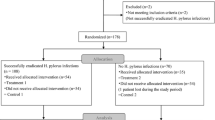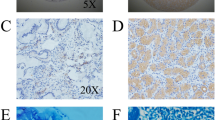Abstract
Cyclooxygenase-2 (COX-2) expression and certain growth hormones, such as gastrin, have been related to gastric carcinogenesis, but little is known about the factors that enhance this COX-2 expression and whether specific blockade of this enzyme has any influence on tumor growth and progression. Our objective was to determine the influence of a specific COX-2 inhibitor, rofecoxib (Vioxx), on serum and tumor levels of gastrin and its precursor, progastrin, as well as on tumor gene expression of COX-2, peroxisome proliferator-activated receptor gamma (PPARγ), and apoptosis-related proteins (Bax and Bcl-2, caspase-3, and survivin). Twenty-four gastric cancer (GC) patients entered this study and were examined twice, once before and then following a 14-day treatment with Vioxx at a dose of 25 mg twice daily. For comparison, 48 age- and sex-matched healthy controls and 24 similarly matched Helicobacter pylori (Hp)-positive subjects were enrolled and treated with Vioxx as GC patients. Serum levels of anti-Hp and anti-CagA antibodies as well as IL-8 and TNF-α were measured by enzyme-linked immunosorbent assay (ELISA), while serum and tumor contents of progastrin and amidated gastrin were determined by specific RIA. Tumor gene and protein expressions of COX-2, PPARγ, Bax and Bcl-2, caspase-3, and survivin were determined by RT-PCR and western blot. The overall Hp and CagA seropositivity in 24 GC patients was significantly higher (82% and 47%) than in 48 controls (61% and 22%) but not in 24 Hp-infected subjects (100% and 38%). Serum IL-8 and TNF-α values were significantly higher in GC patients than in controls without GC or Hp-infected controls. Median serum progastrin and gastrin levels were found to be significantly higher in GC than in controls without GC and in Hp-positive subjects. Treatment of GC patients with Vioxx resulted in a significant decrease in plasma and tumor contents of both progastrin and gastrin, and this was accompanied by the increment in tumor expression of COX-2, PPARγ, Bax, and caspase-3 with a concomitant reduction in Bcl-2 and survivin expression. We conclude that: (1) GC patients show significantly higher Hp and CagA seropositivity than age- and sex-matched controls, but not Hp-positive subjects, indicating that infection with cytotoxic Hp is linked to GC. (2) Serum progastrin and gastrin levels are signficantly higher in GC patients than in matched controls, confirming that both gastrins may be implicated in gastric carcinogenesis. (3) GC patients exhibit significantly higher levels of IL-8 and TNF-α than non-GC controls and Hp-positive subjects, probably reflecting more widespread gastritis in GC. (4) COX-2, PPARγ, Bcl-2, and survivin were overexpressed in gastric tumor, but the inhibition of COX-2 activity by Vioxx resulted in a significant reduction in serum and tumor levels of progastrin and gastrin and serum IL-8 and TNF-α levels, suggesting that gastrin and proinflammatory cytokines could mediate the up-regulation of COX-2 in gastric cancerogenesis. (5) Vioxx also enhanced expression of COX-2, PPARγ, Bax, and caspase-3, while inhibiting the expression of Bcl-2 and survivin, suggesting that COX-2 blockade might be useful in chemoprevention against cancer possibly due to enhancement of the PPAR-γ and proapoptotic proteins-dependent apoptosis and the reduction in progastrin/gastrin-induced promotion of tumor growth.
Similar content being viewed by others
References
Correa P: Human gastric carcinogenesis: a multispet and multifactorial process. First American Cancer Society Award Lecture on Cancer Epidemiology and Prevention. Cancer Res 52:6735-6740, 1992
Uemura N, Okamoto S, Yamamoto S, Matsumura N, Yamaguschi S, Yamakido M, Taniyama K, Sasaki N, Schlemper RJ: Helicobacter pylori infection and the development of gastric cancer. N Engl J Med 345:784-789, 2001
Graham D: Helicobacter pylori infection is the primary cause of gastric cancer. J Gastroenterol 35 (Suppl 12):90-97, 2000
Filipe MI, Munoz N, Matko I, Kato I, Pompe-Kim V, Jutersek A, Tauchmann S, Benz M, Prijon T: Intestinal metaplasia types and the risk of gastric cancer: a cohort study in Slovenia. Int J Cancer 57:324-329, 1994
You WC, Li JY, Blot WJ, Chang YS, Jin ML, Gail MH, Zhang L, Liu WD, Ma JL, Hu YR, Mark SD, Correa P, Fraumeni JF Jr, Xu GW: Evolution of precancerous lesions in a rural Chinese population at high risk of gastric cancer. Int J Cancer 83(5):615-619, 1999
Xia HH, Talley NJ: Apoptosis in gastric epithelium induced by Helicobacter pylori infection: implications in gastric carcinogenesis. Am J Gastroenterol 96:16-26, 2001
Moss SF, Calam J, Agarwal B, Wang S, Holt PR: Induction of gastric epithelial apoptosis by Helicobacter pylori. Gut 38:498-501, 1996
Peek RM, Moss SF, Tham KT, Perez-Perez GI, Wang S, Miller GG, Atherton JC, Holt PR, Blaser MJ: Helicobacter pylori cagA+ strains and dissociation of gastric epithelial cell proliferation from apoptosis. J Natl Cancer Inst 89:863-868, 1997
Konturek PC, Pierzchalski P, Konturek SJ, Meixner H, Faller G, Kirchner T: Helicobacter pylori induces apoptosis in gastric mucosa through an upregulation of Bax expression in humans. Scand J Gastroenterol 34:375-383, 1999
Leung WK, To KF, Chan FKL, Lee TL, Chung SCS, Sung JJY: Interaction of H. pylori and NSAID on gastric epithelial cell apoptosis and proliferation: implications on ulcerogenesis. Aliment Pharmacol Ther 14:879-885, 2000
Leung WK, Yu J, To KF, Go MY, Ma PK, Chan FK, Sung JJ: Apoptosis and proliferation in Helicobacter pylori-associated gastric intestinal metaplasia. Aliment Pharmacol Ther 15(9):1467-1472, 2001
Leung WK, Sung JJ: Review article: intestinal metaplasia and gastric carcinogenesis. Aliment Pharmacol Ther 16:1209-1216, 2002
Leung WK, To KF, Chan KL, Lee TL, Chung SCC, Sung JJY: Interaction of Helicobacter pylori eradication and nonsteroidal antiinflammatory drugs on gastric epithelial apoptosis and proliferation: implications in ulcerogenesis. Aliment Pharmacol Ther 14:879-885, 2000
Konturek PC, Rembiasz K, Konturek SJ, Stachura J, Bielanski W, Galuszka K, Karcz D, Hahn EG: Gene expression of ornithine decarboxylase, cyclooxygenases-2 and gastric in atrophic gastric mucosa infected with Helicobacter pylori before and after eradication therapy. Dig Dis Sci 48:36-46, 2003
Ohkusa T, Ohkusa T, Fujiki K, Takashimizu I, Kumagai J, Tanizawa T, Eishi Y, Yokoyama T, Watanabe M: Improvement in atrophic gastritis and intestinal metaplasia in patients in whom Helicobacter pylori was eradicated. Ann Intern Med 134(5):380-386, 2001
Correa P, Fontham ETH, Bravo JC, Bravo LE, Ruiz B, Zarama G, Realpe JL, Malcom GT, Li D, Johnson WD, Mera R: Chemoprevention of gastric dysplasia: randomized trial of antioxidant supplements and anti-Helicobacter pylori therapy. J Natl Cancer Inst 92(23):1881-1888, 2000
Uemura N, Mukai T, Okamoto S, Yamaguchi S, Mashiba H, Taniyama K, Sasaki N, Haruma K, Sumii K, Kajiyama G: Effect of Helicobacter pylori eradication on subsequent development of cancer after endoscopic resection of early gastric cancer. Cancer Epidemiol Biomarkers Prev 6(8):639-642, 1997
Lim HY, Joo HJ, Choi JH, Yi JW, Yang MS, Cho DY, Kim HS, Nam DK, Lee KB, Kim HC: Increased expression of cyclooxygenase-2 protein in human gastric carcinoma. Clin Cancer Res 6:519-525, 2000
Konturek PC, Konturek SJ, Pierzchalski P, Bielanski W, Duda A, Marlicz K, Starzynska T, Hahn EG: Cancerogenesis in Helicobacter pylori infected stomach—role of growth factors, apoptosis and cyclooxygenases. Med Sci Monit 7:1092-1107, 2001
Joo YE, Oh WT, Rew JS, Park CS, Choi SK, Kim SJ: Cyclooxygenase-2 expression is associated with well-differentiated and intestinal-type pathways in gastric carcinogenesis. Digestion 66:222-229, 2002
Konturek PC, Konturek SJ, Pierzchalski P, Starzynska T, Marlicz K, Hartwich A, Zuchowicz M, Darasz Z, Papiez D, Hahn EG: Gastric MALT-lymphoma, gastrin and cyclooxygenases. Acta Gastroenterol Belg 65:17-23, 2002
Kawabe A, Shimada Y, Uchida S, Maeda M, Yamasaki S, Kato M, Hashimoto Y, Ohshio G, Matsumoto M, Imamura M: Expression of cyclooxygenase-2 in primary and remnant gastric carcinoma: comparing it with p53 accumulation, Helicobacter pylori infection, and vascular endothelial growth factor expression. J Surg Oncol 80:79-88, 2002
Hartwich A, Konturek SJ, Pierzchalski P, Zuchowicz M, Labza H, Konturek PC, Karczewska E, Bielanski W, Marlicz K, Starzynska T, Lawniczak M, Hahn EG: Helicobacter pylori infection, gastrin, cyclooxygenase-2m and apoptosis in colorectal cancer. Int J Colorectal 16:202-210, 2001
Konturek PC, Bielanski W, Konturek SJ, Hartwich A, Pierzchalski P, Gonciarz M, Marlicz K, Starzynska T, Zuchowicz M, Darasz Z, Gotze JP, Rehfeld JF, Hahn EG: Progastrin and cyclooxygenase-2 in colorectal cancer. Dig Dis Sci 47:1984-1991, 2002
Yao M, Song DH, Rana B, Wolfe MM: COX-2 selective inhibition reverses the trophic properties of gastrin in colorectal cancer. Br J Cancer 27:574-579, 2002
Konturek PC, Kania J, Kukharsky V, Ocker S, Hahn EG, Konturek SJ: Influence of gastrin on the expression of cyclooxygenase-2, hepatocyte growth factor and apoptosis-related proteins in gastric epithelial cells. J Physiol Pharmacol 54:17-32, 2003
Tsujii M, DuBois RN: Alterations in cellular adhesion and apoptesis in epithelial cells overexpressiong prostaglandin endoperoxide synthase-2. Cell 83:493-501, 1995
Tsujii M, Kawano S, DuBois RN: Cycclooxygenase-2 expression in human colon cancer cells increases metastatic potential. Proc Natl Acad Sci USA 94:3336-3340, 1997
Sato H, Ishihara S, Kawashima K, Moriyama N, Suetsugu H, Kazumori H, Okuyama T, Rumi MA, Fukuda R, Nagasue N, Kinoshita Y: Expression of peroxisome proliferator-activated receptor (PPAR)gamma in gastric cancer and inhibitory effects of PPARgamma agonists. Br J Cancer 83(10):1394-1400, 2000
Haweroft G, Gardner SH, Hull MA: Activation of peroxisome proliferator-activated receptor (gamma) does not explain the anti-proliferative activity of the non-steroidal antiinflammatory drug. J Pharmacol Exp Ther 11, 305:632-637, 2003
Bielanski W, Konturek SJ: New approach to C-urea breath test in capsule-based modification with low dose of C-urea in diagnosis of Helicobacter pylori infection. J Physiol Pharmacol 47:545-553, 1996
Konturek PC, Konturek SJ, Bielanski W, Karcazewska E, Pierzchalski P, Duda A, Starzycka T, Marlicz K, Popiela T, Hartwich A, Hahn EG: Role of gastric in gastrin cancerogenesis in Helicobacter pylori infected humans. J Physiol Pharmacol 50:857-879, 1999
Konturek PC, Konturek SJ, Stachura J, Duda A, Meixner H, Starzynska T, Sulekova Z, Karczewska E, Marlicz K, Hahn EG: Expression of hepatocyte growth factor, transforming growth factor, apoptosis related proteins Bax and Bcl-2 in human gastric cancer. Aliment Pharmacol Ther 15:989-999, 2001
Chomczynski P, Sacchi N: Single step method of RNA isolation by acid guanidinium guandinium thiocyanate—phenol—chloroform extraction. Anal Biochem 162:156-159, 1987
Ricote M, Li AC, Willson TM, Kelly CJ, Glass CK: The peroxisome proliferator-activated receptor-g is a negative regulator of macrophage activation. Nature 391:79-82, 1998
Naito Y, Takagi T, Matsuyama K, Yoshida N, Yoshikawa T: Pioglitazone, a specific PPARγ ligand, inhibit aspirin-induced gastric mucosal injury in rats. Aliment Pharmacol Ther 15:865-873, 2001
Konturek PC, Kania J, Bazela K, Hahn EG, Konturek SJ: Protective effect of PPARγ on acute lesions induced by ischemia—reperfusion. Scand J Gastroenterol 2003 (in press)
Ernst P: Review article: The role of inflammation in the pathogenesis of gastric cancer. Aliment Pharmacol Ther 13(suppl):13-18, 1999
Konturek PC, Kania J, Konturek SJ, Ocker M, Hahn EG: Implication of peroxisome proliferator-activated receptor γ (PPAR γ) in gastric carcinogenesis: link to Helicobacter pylori-infection. Aliment Pharmacol Ther 38:468-476, 2003
Yang W-L, Frucht H: Activation of the PPAR pathway induces apoptosis and COX-2 inhibition in HT-29 human colon cancer cells. Carcinogenesis 22:1379-1383, 2001
Kitamura S, Miyazaki Y, Hiraoka S, Toyota M, Nagasawa Y, Kondo S, Kiyohara T, Shinomura Y, Matsuzawa Y: PPARγ inhibits the expression of c-MET in human gastric cancer cells through the suppression of Ets. Biochem Biophys Res Commun 265:453-456, 1999
Dockray GJ, Varro A, Dimaline R, Wang T: The gastrins: their production and biological activities. Annu Rev Physiol 63:119-139, 2001
Author information
Authors and Affiliations
Rights and permissions
About this article
Cite this article
Konturek, P.C., Konturek, S.J., Bielanski, W. et al. Influence of COX-2 Inhibition by Rofecoxib on Serum and Tumor Progastrin and Gastrin Levels and Expression of PPARγ and Apoptosis-Related Proteins in Gastric Cancer Patients. Dig Dis Sci 48, 2005–2017 (2003). https://doi.org/10.1023/A:1026387908165
Issue Date:
DOI: https://doi.org/10.1023/A:1026387908165




